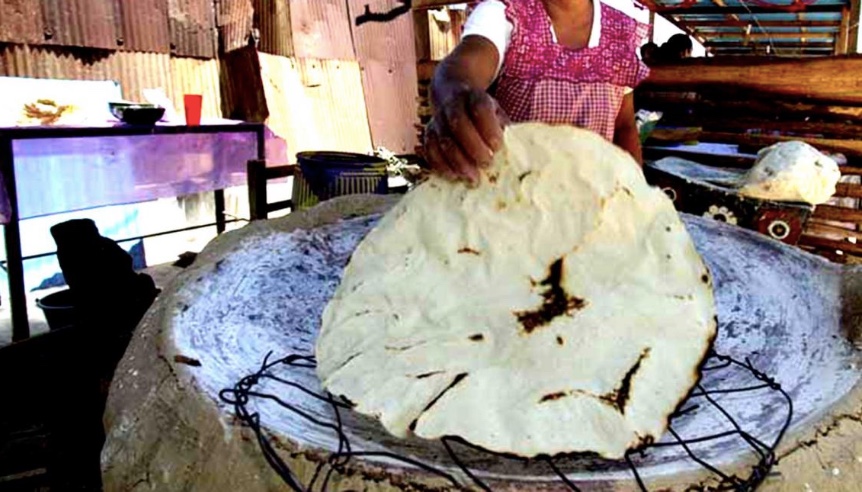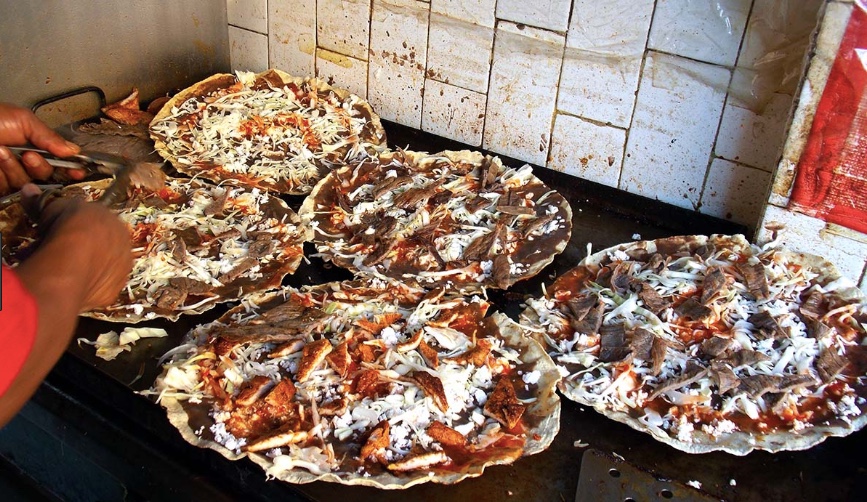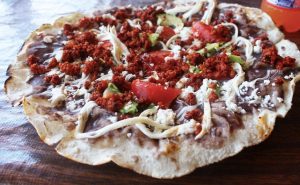Second only to dark chocolaty mole negro, tlayudas are without a doubt the principal, uniquely Oaxacan, culinary seduction, renowned throughout Mexico. While eaten virtually any time of day or night, tlayudas are more typically consumed late evenings, and tradition suggests that they be purchased from street vendors.
Tlayudas México 68 is one such nighttime stand that has meteorically grown in popularity since its inception a dozen years ago. In 2006, Giezi was an 18-year-old adolescent living with his family in Colonia Loma Linda, a suburb of the city of Oaxaca. He had been working at a nearby taco stand when one day he began a discussing a business project with his mother, Alma. Within a few months the two of them opened Tlayudas México 68, in the Colonia Olímpica neighborhood of the city, close to their home. It was just Giezi and his mom.
Tlayudas come in different incarnations, the only constant being the main ingredient, which is an oversized, somewhat crispy all-corn tortilla, usually about a foot or more in diameter, with toppings and/or accompaniments. A single tlayuda constitutes a full meal, as distinct from tacos, tostadas and the like. It can be vegetarian, vegan, even kosher style just for the asking. But the most common formulation is a very thin layer of pork fat (asiento), followed by a patting of bean paste, then Oaxacan string cheese (quesillo), and meat either inside the tlayuda or alongside it.
Sometimes they are served open faced, and sometimes folded over in half. Often lettuce, tomato and avocado is included, but certainly not always. Typically condiments are served with it, consisting of salsa, guacamole, marinated onions and chiles, an aromatic herb (chepiche), and/or grilled onions. The meat is usually beef (tasajo or arrachera), pork (cecina), pork rib (costilla) or Mexican sausage (chorizo); less so shredded chicken. If ordered from a restaurant or roadside eatery (comedor), one can often substitute fried egg and/or mushrooms for the meat/cheese protein. Tlayudas are grilled over charcoal, either placed directly on the coals or on a grate above. For the asking, your tlayuda can be custom designed.
Tlayudas México 68 took off immediately. Until then there were very few nearby local haunts for getting tlayudas. There are many places downtown, as well as flecking different neighborhood streets in and near the city. But up that way, bordering the wealthy north suburb of San Felipe del Agua, and close to middle class Colonia Reforma and upstart Colonia Loma Linda, there really wasn’t much.
And right around the time of the stand’s inauguration, Oaxaca was experiencing a great deal of civil unrest. Members of the working and upper classes were loath to venture downtown because of teacher protests and marches, road blockades, vandalism, and even nighttime tire fires in major city intersections, often outright precluding the ability of residents to venture to the city’s core even if they wanted to.
Giezi and Alma opened at the right place (on Calle México 68) at precisely the right time, and haven’t looked back. The complement of employees / business partners has grown substantially. Alma and two sisters stay at home in Loma Linda and daily prepare the salsas, guacamole and other accompaniments as well as fresh juices (aguas frescas; horchata and jamaica). Suppliers deliver all the other ingredients to the house which are needed for a late afternoon start-up, such as quesillo, raw meats (arrachera and costilla), tortillas and other corn products, fruit, vegetables, charcoal, etc.
The stand begins set-up around 4:30 pm, and is open for business from 7 pm to midnight, seven days a week. It is operated by ten people, including Giezi and his wife, his four brothers and the wife of one of the brothers, and three friends who have day jobs; an accountant, a key cutter, and an ironworker. For the seven family members, this is their sole source of income. But they prepare for more than just on the street where patrons can pull up a plastic bench to chat while awaiting what they have ordered. They also do take-out, home delivery, and events such as birthdays, anniversaries and school graduations.
Giezi and one of his brothers split two-week shifts. For one period Giezi works at México 68 while the brother does home deliveries and events, and then they switch jobs. They’ve done events where they’ve prepared as many as 1,200 tlayudas. While tlayudas are the mainstay, they also do a brisk business grilling tacos and tostadas.
For take-out, the condiments are packaged in small plastic bags. For events, team members set up a veritable mini México 68 at homes, schools and event halls, bringing along their grills, charcoal, tables, and whatever else the client needs.
It’s common to see more than a dozen cars, trucks and motorcycles parked along both sides of México 68, well into the night, seven days a week, drivers and their passengers awaiting their orders. Smoke billows from the grill, the quesillo is being shredded, the meats are being barbequed and then chopped, and finally the tlayudas are being armed together based on the wishes of the patron, folded, placed on the grill, and finally heated to perfection before being either served on a plate or packed with condiments for take-out or home delivery.
The logistics of it all? A member of the team connects to a hydro (electrical) wire every night, with the permission of the neighborhood including the local church. For Giezi, it’s crucial that their neighbors are treated with the utmost respect and deference. The city renews the on-street permit annually. All workers must obtain medical examinations twice yearly, and attend training on sanitary food preparation and service. So now you know, at least should you venture to México 68.
Giezi and family have considered opening a branch, but have so far resisted because of concerns about having non-family or friends as employees, and thus worrying about them not showing up for work, arriving late, or quitting without providing sufficient advance notice. And why even both, when, as in the case of Tlayudas México 68, patrons come from as far as the outer reaches of the Etla villages and further beyond, often more than 40 minutes away, just to sit and eat tlayudas, tacos and tostadas, all prepared to order by their favorite nighttime stand.
Alvin Starkman owns and operates Mezcal Educational Excursions of Oaxaca (www.mezcaleducationaltours.com).



